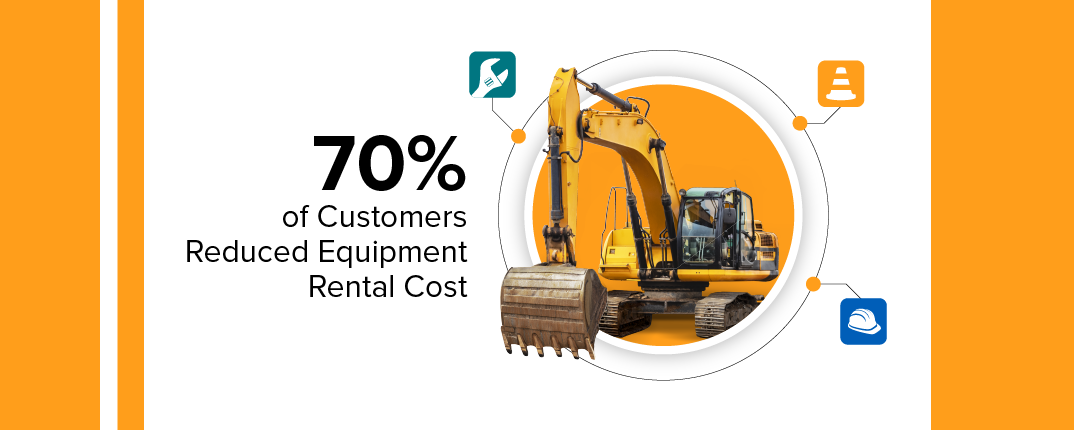Your fleet dispatching process is one of the crucial factors in fleet operations. If you've got folks driving to and from project sites, you're already running a fleet dispatch operation. Much like an orchestra with a conductor — your drivers and operators are like the musicians following the lead of a dispatcher. When done right, fleet dispatching can boost your efficiency, optimize your equipment utilization, and overall save your business loads of time and money.
That said, the more wheels and drivers you have, the trickier it gets to keep everything running smoothly and on schedule. Between playing nice with drivers and tracking every piece of equipment on the road, it’s the dispatcher’s duty to make data-driven decisions to improve your fleet management processes. Their role consists of layers of responsibilities and complex problems.
Therefore, we’ll be going over the top five challenges dispatchers face within their process and (more importantly) how they can improve them.
1. Schedule Your Equipment & Drivers in Advance
One of the toughest hurdles for dispatchers is coming up with the most efficient use of equipment and drivers to keep projects running smoothly. For example, let’s say your dispatcher is juggling calls and paperwork. A project comes in needing two compactors, and they think, “Sure, no problem!” But without reliable dispatching software, they forget that one of the compactors was in the shop for maintenance that day. As a result, the compactor is double-booked, inevitably causing a delay in the project.
Create a Scheduling Masterpiece with HCSS Dispatcher
Sorting out your equipment and drivers is key to achieving maximum efficiency and staying on budget. The days of walkie-talkies, physical magnet boards, and spreadsheets are over. With fleet dispatching software like HCSS Dispatcher, you get a full view of all available equipment in your fleet, crew schedules, and a comprehensive map view to see all your jobsites.
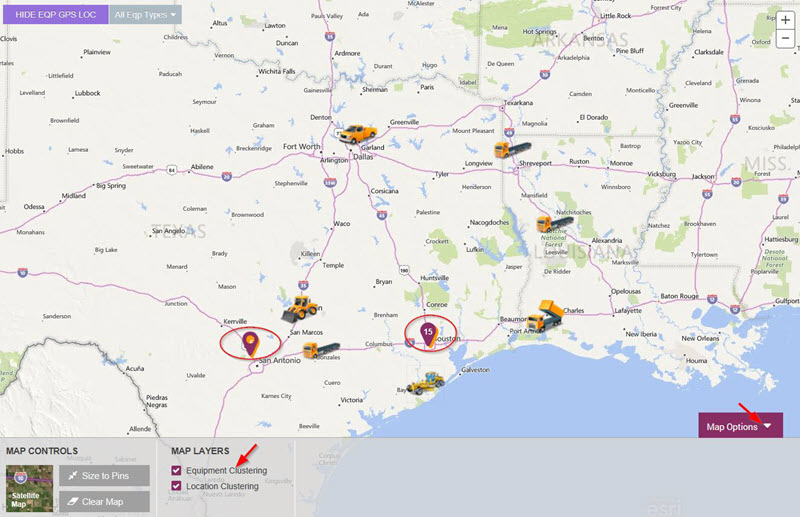
Along with a map view, the software allows dispatchers to prioritize prescheduling so that every piece of equipment finds its next project site weeks in advance. By texting schedules to operators and drivers, everyone stays synced up and informed, paving the way for smoother operations. Additionally, any equipment moves that need lowboys for transportation are automatically fed into the Dispatch Driver module for driver scheduling.
From your crews and equipment to your inventory items and rentals, the smooth point-and-click- environment helps you plan for the future — ensuring you have everything you need to stay ahead of the game and on top of your schedule.
2. Keep Track of Underutilized Equipment
Right below knowing where your equipment is at any given time is keeping tabs on its performance. Whether it’s the crane idling at a construction site or the underutilized paver sitting in your lot, your dispatcher must stay on top of it all.
It’s money management 101 for them.
That said, inefficiencies like underutilization will always be a dispatcher’s Achilles heel. For every idle truck and dormant loader in your fleet, a portion of your profits slip through the cracks. Utilization is your number one fleet metric, and it’s the key to ensuring every piece of equipment (rented or owned) pulls its weight. This way, you are not leaving money on the table.
Full Fleet Visibility with HCSS Telematics & Equipment360
The beauty of fleet management software is in the integrations. Sure, a few solid features could help scale your fleet, but combine them with other powerful tools, and you can completely revolutionize your operations.
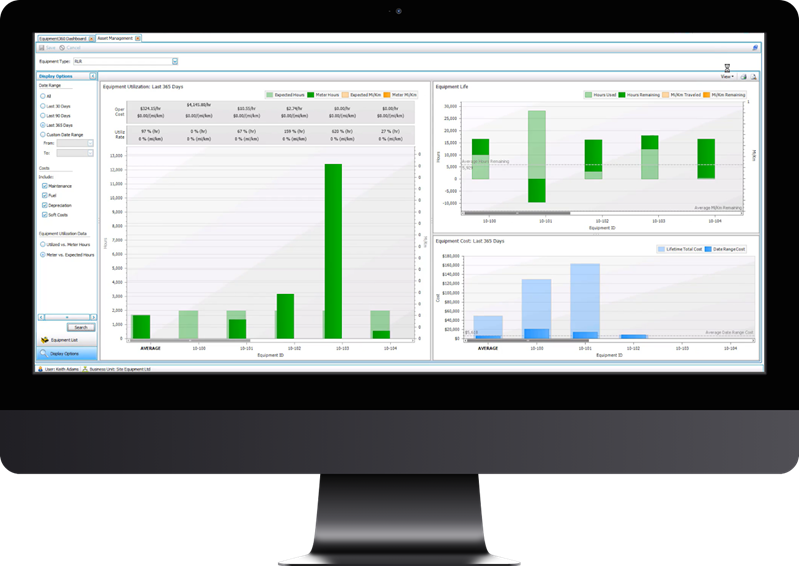
For example, if your dispatcher needs to stay on top of which site(s) your assets are at, HCSS Dispatcher has more than enough features to locate, schedule, and sync with drivers. However, for even more precision and optimization, combine it with Telematics to get real-time data like runtime, driver behavior, and maintenance alerts — giving your dispatchers all the information they need to maximize uptime.
No more over-renting equipment that’ll collect dust at the lot.
If you’re looking to really elevate how you fleet, combine both of those with Equipment360 to analyze equipment utilization, depreciations, budgets, and expected life cycle of equipment through full, customizable reports. Dispatchers won’t have to enter meter readings manually; they can track fault codes, device diagnostics, and fuel levels straight from Equipment360.
Better data means better decisions. Utilizing these integrations allow your dispatcher to improve their decision making and, in turn, improves the efficiency of your entire fleet operation.
3. Trained Fleet Drivers are Safe Fleet Drivers
One accident, one injury — that’s all it could take to raise your insurance rates and possibly lead to legal troubles against your company. While it’s tough to avoid all incidents, there are plenty of ways to decrease the likelihood of these mishaps.
Safety shouldn’t simply be another box to tick — it's serious business. According to the Occupational Safety & Health Administration (OSHA), “Construction can be a safe occupation when workers are aware of the hazards, and an effective Safety and Health Program is used.”

Investing in driver training and setting up solid safety rules isn't just about following them; it's about making safety a way of life in your entire fleet. When you give drivers the tools and knowledge to stay safe, you're giving them the power to make better choices on the site, cutting down on accidents and injuries.
Here are a few ways you can improve your fleet safety:
Hire a safety management professional - Bring on a safety manager to ensure equipment is safe and drivers get the proper training to detect any mechanical violations.
Lean on technology - HCSS Safety tracks training certifications, safety meetings, site inspections, and near-miss incidents to help prevent them from happening again.
Make safety training a part of your culture - Provide drivers/operators with up-to-date safety resources. Encourage them to follow safety protocols for the livelihood of their equipment and, most importantly, themselves.
4. Communication Makes Everything Run Smoothly
Good communication isn't just nice to have; it's a must for a fleet to be dispatched without any hiccups. If dispatchers, managers, and drivers/operators don’t play nice, things can go haywire quickly! That's where a tool like HCSS Dispatcher is essential. It gives everyone in the organization the reports they need.
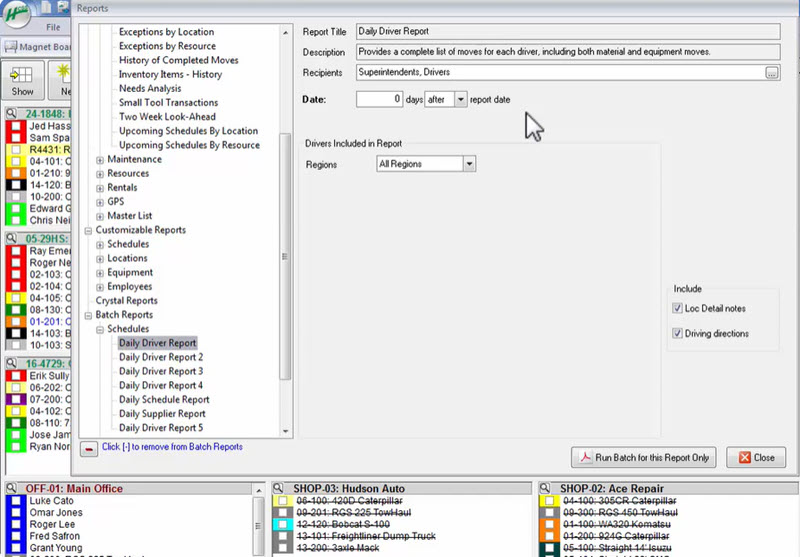
With ‘Batch Reporting,’ dispatchers can send lowboy drivers easy-to-use reports of their equipment moves with driving directions and other notes. They can also ensure that Foremen, PMs, and Superintendents get their crew’s daily schedule reports broken down by location, with extra information like inventory and material orders.
Dispatchers can also create custom email templates to shoot directly to operators and lowboys to inform them of their upcoming schedules. Everybody stays in the loop, ensuring things run like a well-oiled machine. And when hiccups do happen, they're nipped in the bud, keeping your fleet running at maximum efficiency.
5. Prioritize Your Fleet Dispatch Software
If you want a high-performing fleet, implementing fleet dispatching software shouldn’t even be a question in this competitive market. With most dispatchers still relying on old-school spreadsheets and paper systems, it’s no wonder they lag behind.
If you want to really give your company a serious edge and become an efficient machine, you have to rely on technology.
Here are a few ways HCSS Dispatcher, for example, can help you get a leg up on the competition:
Efficient Resource Management
Dispatchers can optimize your fleet's routes, schedules, and assignments. This means your teams can get more done in less time, allowing you to move more efficiently and take on more projects.
Real-Time Tracking
With our Telematics software, Dispatchers know where vehicles and equipment are and how they are performing at all times. This agility can make your operations more reliable and responsive.
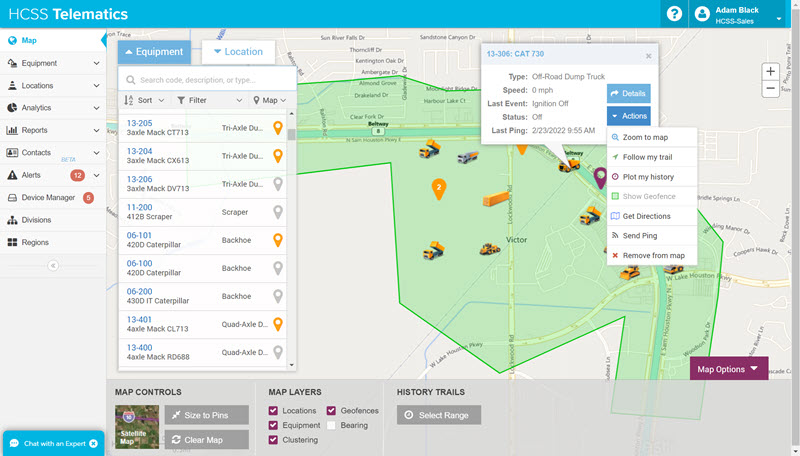
Data-Driven Decision Making
With Equipment360 and Telematics, Dispatchers get valuable insights into operations like fuel usage, detailed vehicle performance, and driver behavior. These close-up data points allow your dispatcher to identify areas for improvement and make the right calls every time.
Learn More About HCSS Fleet Solutions
Equip your dispatchers with everything they need to outperform the competition and stay as efficient as possible. HCSS fleet management software is your solution. To learn more about how you can keep your dispatch process running smoothly, book a demo today!

